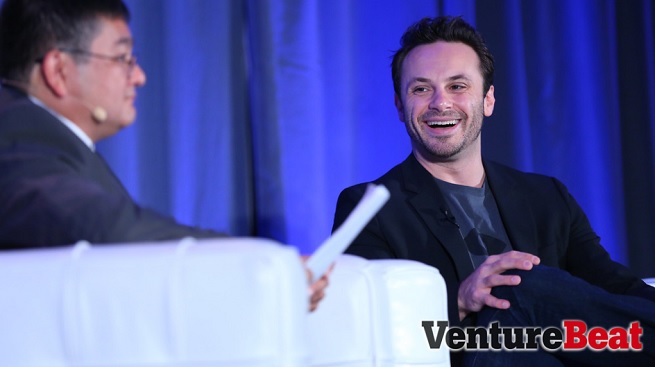GamesBeat: Is the content in high-end 3D games portable now to Oculus? Or do you believe that they have to work on games for Oculus from the ground up?
Iribe: The best content is going to be made for Oculus. That’s always been the case. You don’t port PC games to an iPhone. You don’t typically port iPhone games to a console. VR is very much a new platform. It’s going to need made-for-VR games.
At the same time, we do benefit from being able to port some PC games. You can add VR modes and look around and have head tracking. It does enhance the experience. It’s fun, and it’s something that I think a lot of people are going to have a lot of fun jumping into — whether it’s Half-Life or even iRacing or Project CARS — these really cool games that were originally made for a 2D monitor and keyboard/mouse or game pad. It’s neat jumping in there in VR. But these games will probably still be best played on the platforms they were designed before.
When you make it for Oculus, it’s going to be best played on Oculus. We’re out there looking at funding and helping out developers create content that’s made for Oculus.
GamesBeat: Marc Andreessen has built a few billion-dollar companies. He seems like a pretty good investor. He’s also got an interest in gaming. That might make him a good fit for you guys?
Iribe: He’s been awesome to talk to and work with so far. He got started in computer science, largely in VR, working on building the CAVE stuff back at the University of Illinois, 20 or 25 years ago. He has a love for the tech and the concept. He went on to build a browser that changed the world.
Looking all the way to where Oculus is and this combination of all this great tech finally being realized, there’s a lot of love from a technologist like Marc for building out Oculus. It’s a platform — there are all these pieces he knows very well – but it’s also ground-breaking. It will disrupt many industries and change the world, assuming we deliver on the promise, which we feel like we’re very close to doing.
I’m looking forward to getting a lot of Marc’s advice, and Chris Dixon’s as well. Chris is also an operator. He’s run companies and done startups before. I’m excited to get their input along the way and make sure we don’t make too many mistakes.
 GamesBeat: Did they communicate some other things about why they invested. Clearly they liked your demo,
GamesBeat: Did they communicate some other things about why they invested. Clearly they liked your demo,
Iribe: They liked the vision and the team. That’s a big part of it. The technology has crossed a lot of hurdles. It works now. We’re not going to hit some kind of fundamental barrier of entry. The experience is good enough for mass-market consumers to enjoy. Now it’s very much about the team and the vision of where we want to go. We’re in alignment there.
There’s a lot more that people are going to do with Oculus than just games. It’ll extend beyond into film and education and design of all kinds. In the long term, it’s very much about communication. It’s about multi-user communication. That’s what has the largest audience. The world wants to communicate.
You started with a personal computer on your desk, and we’re going to start with personal VR on your desk. Hopefully over the next decade or two, as we continue to build this out and work toward the vision, we’ll continue to shrink the form factor and improve the experience. There will be this shift, much like the smartphone. The personal computer on your desk turned into a laptop, and then it finally turned into a personal computer in your pocket. You’ll see a similar evolution with VR. One day, a decade or two from now, we hope to realize the vision of having VR in everyone’s pocket. You and I could have a face to face meeting and it will feel just like you’re really there, yet we’ll be in different places.
That will have such a huge impact on the world, when you can be free of this 2D screen and have communication and video conferencing that’s not video conferencing, but VR conferencing. We’ll be able to break down the barrier of the monitor we’ve had to stare through for 40 years.
GamesBeat: How do you feel about waking the sleeping giants at Microsoft and Sony and Nintendo?
Iribe: There will be a handful of big companies, we hope, that get into this. We hope their technology pushes the ball forward. Competition makes for better products for the consumer, usually. As long as nobody does anything too crazy and everyone just tries to deliver the best product possible, it’s going to be a lot of fun to see what other companies come up with.
We have a few partners we’ve been working closely with. We have our strategy focused on the PC and mobile. In our vision, that’s where VR needs to be. It’s going to be an exciting time. All we hope is that, much like Valve—What we all hope is that the VR of the future is really good. What we don’t want to see is bad experiences. We want comfortable breakthrough experiences.
That’s why we’re taking our time. We hope that the other major players out there do take the time to get it right and don’t just throw something over the fence that delivers a bad experience. We’ve heard some rumors that they could do that. We’re a little concerned. We hope they take the time to get it right.
GamesBeat: Are you planning much for the 2014 International CES in January? Will you show off any new things?
Iribe: We’ll see when we get there. I think we’ll have something that gets people excited, but we can’t say what it is yet. It’s still coming together.
GamesBeat: Is there anything else?
Iribe: Thank you for your support along the way. Like when we lost Andrew.
GamesBeat: I think Andrew would be proud of what you’ve done at Oculus.
VentureBeat's mission is to be a digital town square for technical decision-makers to gain knowledge about transformative enterprise technology and transact. Learn More




